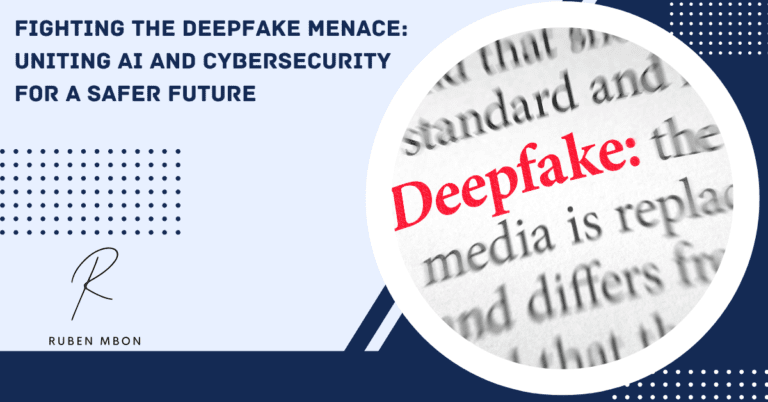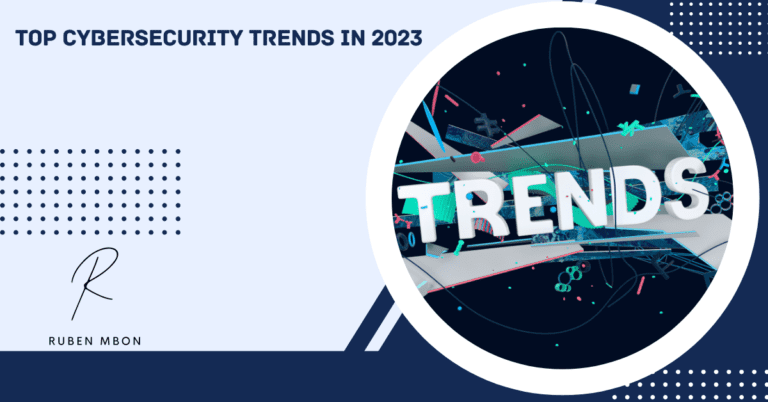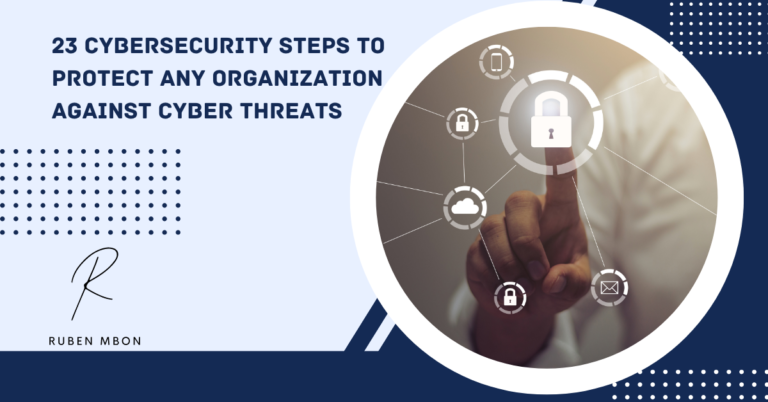Introduction
Artificial Intelligence (AI) is becoming increasingly prevalent, but its potential implications for cybersecurity are still unknown.
Cybersecurity professionals must grapple with whether AI will be a game-changer or a threat to security. With OpenAI ChatGPT and other developments, it’s clear that AI can revolutionize cybersecurity – but what are the risks?
In this blog post article, we’ll explore Artificial Intelligence in Cybersecurity – from its benefits and challenges to best practices for implementation. By understanding both advantages and disadvantages of AI, you can make a well-educated decision about how to use Artificial Intelligence to secure your systems today and in the future.
What is Artificial Intelligence?

Artificial intelligence (AI) is the advancement of technology that enables machines to think and act with human-like cognition. Through AI, programmed systems can be built to undertake tasks once done manually by humans, such as learning, problem-solving, and making decisions based on language comprehension.
Some examples of AI include self-driving cars, facial recognition systems, and virtual personal assistants. There are several approaches to developing AI, including machine learning, where a machine is trained to perform a task by being fed large amounts of data, and rule-based systems, where a machine is programmed with a set of rules to follow to perform a task.
Artificial Intelligence in Cybersecurity: An Overview
Artificial Intelligence in Cybersecurity is a developing field that has enabled more effective approaches to detecting and responding to cybersecurity threats. Artificial intelligence-powered security controls are now being used to automate the processes of scanning and responding to security incidents and routine network traffic monitoring for suspicious behaviors.
This optimization of existing solutions is invaluable to organizations of all sizes by providing improved accuracy, effectiveness, and speed regarding the detection and response of cyber-attacks. Artificial Intelligence in Cybersecurity can help these organizations stay one step ahead of malicious attackers while reducing costs associated with manual processes.
Artificial Intelligence and Its Benefits to Cybersecurity

AI is increasingly used as a force multiplier to bolster cybersecurity capabilities.
Artificial intelligence (AI) can provide several benefits to cybersecurity. Some of those benefits are already seen but can only be improved over time. The following are ways AI can be leveraged to bolster cybersecurity:
- Threat detection: AI algorithms can analyze large amounts of data and identify patterns that may indicate a security threat. For example, an AI system can monitor network traffic and identify unusual activity indicative of a cyber attack.
- Threat response: AI algorithms are used, and will continue, to automate the process of responding to security threats. For example, an AI system could automatically block suspicious traffic or shut down a compromised system.
- Vulnerability management: The prompt and automatic vulnerability identification, notification, and tracking of those vulnerabilities’ remediation could be significantly improved. This can help organizations fix vulnerabilities before they are exploited.
- Cybersecurity training: AI can be used to train employees on cybersecurity best practices. For example, an AI-powered chatbot can provide employees with information on identifying and avoiding phishing attacks.
- Threat modeling: AI algorithms can create simulations of potential cyber-attacks, allowing organizations to test their defenses and identify weaknesses. This can help organizations improve their security posture and prepare for real-world attacks.
- Policies and compliance: AI can be used to automate the process of monitoring and enforcing security policies and compliance with industry regulations. For example, an AI system could be used to monitor employee behavior and identify any violations of security policies.
- Data protection: AI algorithms can classify and label data based on sensitivity, helping organizations protect sensitive data and ensure compliance with data protection regulations.
- Fraud detection: AI algorithms can analyze transaction data to identify patterns that may indicate fraudulent activity. This can help organizations prevent financial losses due to fraud.
- Network security: AI algorithms can analyze network traffic and identify patterns that may indicate a security threat. This can help organizations detect and prevent cyber attacks before they cause damage.
- Governance, risk, and compliance (GRC): AI algorithms can automate monitoring and enforcing compliance with industry regulations and internal policies. For example, an AI system could be used to monitor employee behavior and identify any violations of security policies.
- Malware analysis: AI algorithms can analyze malware samples and identify patterns that may indicate a security threat. This can help organizations detect and prevent the spread of malware.
- Secure coding: AI algorithms can analyze software code and identify vulnerabilities that hackers could exploit. This can help organizations fix vulnerabilities before they are exploited and improve the overall security of their systems.
- Enhanced decision-making: AI algorithms can provide CISOs and other cyber executives with the ability to analyze large amounts of data and make more informed decisions about improving their organization’s security posture.
Artificial Intelligence as a Threat to Cybersecurity

While AI technology can certainly be beneficial to cybersecurity, it also presents its own unique set of challenges. For example, cybercriminals are becoming increasingly more advanced by using the same technology to enhance their tactics and techniques. As a result, there is an increased risk of successful cyber-attacks with sophisticated methods.
Moreover, Artificial Intelligence can automate malicious hacking tactics, enabling hackers to launch more sophisticated assaults at an unprecedented velocity.
It is inevitable that malicious actors, just like organizations, will maintain a consistent level of interest in artificial intelligence.
OpenAI ChatGPT – The Latest AI Development
OpenAI ChatGPT (Generative Pre-trained Transformer) is an AI-powered chatbot developed by OpenAI, a research, and development firm founded as a non-profit in 2015 by Silicon Valley investor Sam Altman and billionaire Elon Musk. It uses the GPT-3.5 language technology – a large artificial intelligence model made by OpenAI that has been trained on a massive amount of text data from various sources.
ChatGPT was made available to the public on November 30, 2022, via OpenAI’s website and can be used for applications such as digital marketing, online content creation, answering customer service queries, or debugging software code. It can simulate dialogue, answer follow-up questions, admit mistakes, and recognize patterns that enable it to produce its text mimicking various writing styles.
However, ChatGPT sometimes writes plausible-sounding but incorrect or nonsensical answers and can perpetuate societal biases like those around race, gender, and culture.
How Artificial Intelligence Can Help Secure Systems?

Advanced cybersecurity threats have made protecting systems increasingly difficult for businesses and users alike. That is why AI can be a powerful ally in bolstering system security.
AI’s ability to rapidly recognize patterns, automate responses and anticipate future threats means that it can find solutions more quickly and accurately than manual means. AI can also identify previously unknown attack signatures and generate new diagnostic metrics to analyze and respond to them.
With AI providing many advantages over traditional security solutions, incorporating it into security systems seems obvious. With the help of this innovative technology, we may soon be able to move past tedious manual methods of finding solutions or responding to threats and use AI to combat the evolving cyber world’s increasingly sophisticated attacks successfully.
Challenges Faced by AI-based Security Solutions

AI-based cybersecurity offers unprecedented progress and industry opportunities. However, many challenges still need to be overcome before AI can revolutionize cybersecurity.
One of the main challenges of AI-based security solutions is the quality and availability of data. For AI algorithms to work effectively, they require large amounts of high-quality data. If the data is not of good quality, it can lead to poor performance of the AI system. Additionally, if the data is not available in sufficient quantities, it can limit the effectiveness of the AI system.
Another challenge is the potential for bias in the data used to train AI algorithms. If the data used to train the AI system is not representative enough of the environment in which it will be used, it can lead to biased results. This can have serious consequences, particularly in cybersecurity, where decisions made by AI systems can have significant consequences.
One of the other hindrances lies in AI-based security systems’ lack of interpretability, making it challenging to discern how the system arrived at its decision or conclusion. This can be tricky when attempting to comprehend and troubleshoot the technology.
The security landscape is constantly evolving, and new threats are constantly emerging. This can make it challenging for AI-based security solutions to stay up-to-date and effectively defend against new threats.
Another challenge is integrating AI-based security solutions with existing systems and processes. This can be a complex and time-consuming process, and it is important to ensure that the integration is seamless and does not disrupt existing systems or processes.
Finally, there are limited professionals well-versed in cybersecurity. Adding artificial intelligence (AI) to the equation makes it one of the most critical challenges for AI in cybersecurity.
Despite these challenges, there is no doubt that AI-based cybersecurity solutions will play a significant role in the industry’s future.
Best Practices for Implementing Artificial Intelligence in Cybersecurity

There are some essential considerations to keep in mind when implementing Artificial Intelligence solutions for cybersecurity. among them:
- Understand the boundaries and prejudices of AI: It is essential to remember that although AI may seem like a “miracle,” it still has limitations and biases that can influence its performance. Identifying potential issues with bias or limitation beforehand is necessary to ensure an effective yet fair functioning system.
- Use AI for augmenting human capabilities: AI can be leveraged to improve human performance by automating mundane tasks and providing data-driven insights that help individuals make decisions more effectively. Nevertheless, it is essential to remember not to rely solely on AI technology but to allow humans the opportunity for critical thinking and judgment.
- Implement robust security measures: AI systems can also be vulnerable to cyber attacks, so it is essential to implement robust security measures to protect them. This includes measures such as encryption, authentication, and access control.
- Regularly test and evaluate the AI system: It is essential to evaluate the system regularly to ensure that it performs as expected and to identify and address any issues that may arise.
- Use transparent and explainable AI: It is important to use AI systems that are transparent and explainable so that their decisions and actions can be understood and accounted for. This can help build trust in the AI system and ensure it is used ethically.
- Establish clear policies and procedures: It is essential to establish clear policies and procedures for using AI in cybersecurity, including guidelines for developing and deploying AI systems and protocols for dealing with any issues that may arise.
- Provide ongoing training and support: It is important to provide ongoing training and support to users of the AI system to ensure that they can use it effectively and to identify and address any issues that may arise.
A Look at the Future of Artificial Intelligence in Cybersecurity

As AI evolves, it will likely play an increasingly important role in cybersecurity. Some experts predict that in the future, AI will be able to anticipate and prevent cyber attacks before they occur rather than just reacting to them.
Artificial Intelligence will continue to be leveraged in numerous methods to bolster cybersecurity, such as detecting malicious behavior, thwarting attacks with anomaly detection technology, and making malware analysis less arduous through machine learning-driven tools. Further, we will see AI helping in areas such as industrial or operational technology (OT) cybersecurity, which lack proper coverage.
AI is anticipated to really and finally automate many of the tasks currently handled by cybersecurity professionals, releasing them up and allowing them time to focus on complex projects.
However, challenges associated with using AI in cybersecurity include talent acquisition and data privacy issues. Additionally, AI can change traditional offensive cyberattacks against regular computer systems, and there is a need for greater attention to the potential pitfalls while they can still be addressed[4].
From an economic standpoint, the global cybersecurity AI market is expected to grow at a CAGR (Compound Annual Growth Rate) of 23.6% from 2020 to 2027, reaching $46.3 billion, which means that we are likely to see even more advances in the field of AI-powered cybersecurity in the coming years.
Frequently Asked Questions
How does artificial intelligence affect cyber security?
AI can help improve cybersecurity by analyzing data to identify threats, automating processes, and completing complex tasks. However, attackers can also use it to make their attacks more effective.
How AI can be used as cyber defense?
Artificial intelligence (AI) can be used in various ways to strengthen cyber defense and protect against attacks. This includes analyzing network traffic for suspicious activity, identifying system vulnerabilities, detecting and preventing intrusions, and automating cybersecurity processes. AI can also provide threat intelligence by analyzing data from multiple sources to understand the tactics and techniques used by cyber attackers.
Why AI is the future of cybersecurity?
AI is well-suited to cybersecurity because it can analyze large amounts of data quickly and accurately, automate tasks, adapt to new threats, provide the necessary scale and speed to protect against threats, and identify and prevent potential security breaches before they occur.
What are some examples of AI in cyber security?
AI can be used in cyber security to improve intrusion detection, predict potential threats, identify vulnerabilities, detect phishing attacks and malware, and automate responses to certain types of threats.
Conclusion
Artificial Intelligence has the potential to revolutionize cybersecurity by automating mundane tasks and providing data-driven insights that can help individuals make decisions more effectively.
However, AI systems are also vulnerable to cyber attacks, so it is essential to implement robust security measures such as encryption and access control. Additionally, AI systems should be transparent and explainable so that their actions can be understood and accounted for, while clear policies must be established for using them in cybersecurity.
Ultimately, Artificial Intelligence has the potential to become a game-changer in cybersecurity if used properly with the proper guidance, training, and support; however, it could also become a threat if not implemented carefully or monitored closely also enough; it will increasingly be leveraged by threat actors as well.






